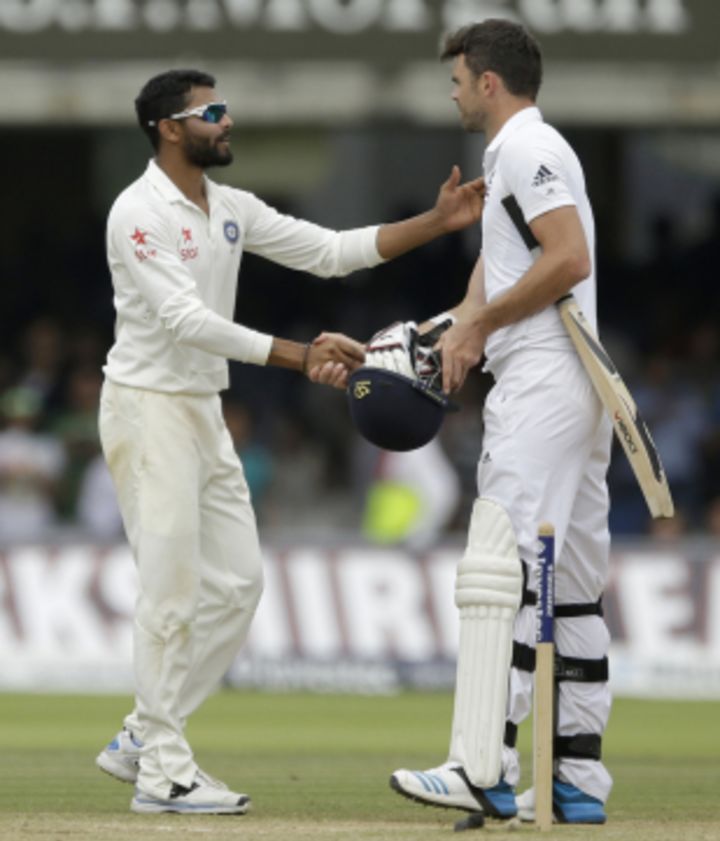The Anderson-Jadeja explainer
An explainer of the procedure followed in the charge against James Anderson and Ravindra Jadeja, the hearings and the appeals

What is the procedure for James Anderson's hearing?
The procedure is at the discretion of the Judicial Commissioner, as long as the hearing is conducted in a manner that offers the player a fair opportunity to present evidence and examine witnesses. The accused, the person who lodged the complaint, and a representative of ICC's legal department must be at the hearing, and they will be allowed to have their lawyers present. The Judicial Commissioner should announce his decision in writing - along with his reasons, details of the incident and sanction, and any right of appeal - in 48 hours from the conclusion of the hearing.
What sort of proof is necessary to find Anderson guilty?
Under Article 6.1 of the Code of Conduct, the standard of proof shall be whether the Judicial Commissioner is 'comfortably satisfied' that the alleged offence has been committed. Depending on the seriousness of the allegation, the standard will vary from a mere balance of probability to proof beyond reasonable doubt.
'Balance of probabilities' is a standard of proof usually used in civil cases. It can be met if the proposition is more likely to be true than not true. 'Proof beyond reasonable doubt' is the highest standard of proof usually applied in criminal proceedings and can be said to have been met if there is no plausible reason to believe otherwise.
Because Anderson is facing a Level 3 charge, and the Code of Conduct says the standard of proof shall be determined on a scale between a 'balance of probability' and 'proof beyond reasonable doubt', the Judicial Commissioner could be 'comfortably satisfied' by a standard of proof that is somewhere between the two.
What if there is no video evidence, making it a person's word against another?
In the absence of video evidence, the Judicial Commissioner may be comfortably satisfied about Anderson's innocence - or guilt - based on oral testimony, legal submissions and cross examinations. Criminal courts routinely satisfy the 'beyond reasonable doubt' standard without the luxury of video evidence.
The situation will be similar to the incident at the SCG in January 2008, where there was no audio or video evidence when Harbhajan Singh was accused of directing racist remarks at Andrew Symonds. The match referee Mike Procter relied on the oral evidence of three Australian players to find Harbhajan guilty. The sentence, however, was suspended following an appeal.
Another possibility is that Anderson may admit to having committed a lesser offence. In Harbhajan's case Justice Hansen, who oversaw the appeal, was unconvinced of his guilt based on the evidence submitted before him, but charged Harbhajan with a lesser offence - abuse and insult not amounting to racism - to which he pleaded guilty. In the absence of video evidence at Anderson's hearing, the scenario could possibly play out in such a manner.
What is the maximum punishment Anderson can get, if found guilty?
Sanctions are of three types - a fine, suspension for a period of time, and imposition of suspension points. For Level 3 offences, four to eight suspension points are imposed on the player. Two suspension points equates to a ban of one Test or two ODIs, depending on the format the player is scheduled to play next. If found guilty of a Level 3 offence, Anderson will be banned from at least the remaining two Tests of the current series.
If found guilty, will Anderson be allowed to appeal?
Decisions made by a Judicial Commissioner under a Level 3 charge may be challenged either by the player or the ICC chief executive. An appeal must be lodged with the ICC's Head of Legal within seven days of the receipt of the written verdict.
The appeal process will not be very different from the initial procedure. An appeal panel, comprising three members of the ICC's Code of Conduct Commission, will hear the matter from the beginning. The panel has the power to increase or decrease, amend or substitute the previous sentence/decision.
Why is Ravindra Jadeja's appeal being conducted alongside Anderson's hearing?
Jadeja was charged under Level 2 but found guilty of a Level 1 offence by match referee David Boon. According to the Code of Conduct, the match referee's decisions in relation to a Level 1 Offence shall be non-appealable.
Though Jadeja had been denied an appeal on this basis, he has now been allowed to appeal after the BCCI's lawyers got involved. One possible legal submission might have been that the appeal was against the original Level 2 charge and not the Level 1 sentence. The Judicial Commissioner for Anderson's case will also oversee Jadeja's appeal via videoconference.
Could a decision in Jadeja's appeal, if heard first, have bearing on Anderson's hearing?
Conducting Jadeja's appeal first is unlikely to have any direct bearing on Anderson case. If the Judicial Commissioner clears Jadeja of any wrong doing, however, it may become a bit more difficult for Anderson to claim his reaction was in self-defence and a response to Jadeja's alleged provocation. Should Jadeja's appeal fail, it will not necessarily strengthen Anderson's defence, because it will only maintain the status quo.
Read in App
Elevate your reading experience on ESPNcricinfo App.